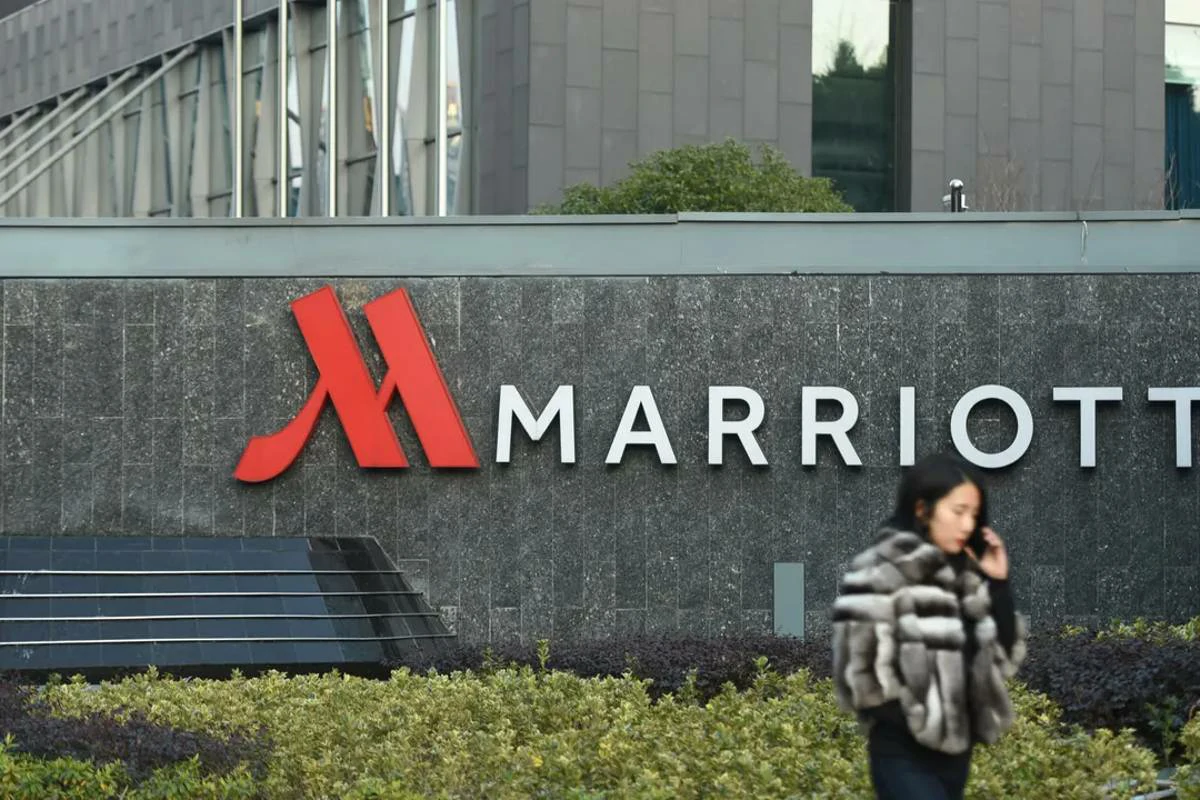Are Marriott hotels franchised? Answer is – Yes, Marriott International operates a mixed model, with many of its hotels owned and operated by franchisees. In fact, around half of Marriott’s vast portfolio of hotels are franchised units, making it the world’s largest lodging company by number of locations and total revenue. This means that while Marriott provides the brand, standards, and support, individual owners invest in and operate the hotels under the Marriott banner.
Summary
- Marriott’s Business Model: A combination of franchised and company-owned hotels.
- Franchising Benefits: Allows rapid expansion, shared investment risk, local market knowledge.
- Franchisee Requirements: Significant financial resources, experience, adherence to brand standards.
- Franchisee Support: Training, marketing, operational systems, ongoing guidance.
- Diverse Portfolio: From luxury brands like Ritz-Carlton to budget-friendly options like Fairfield Inn.
Are Marriott Hotels Franchised?
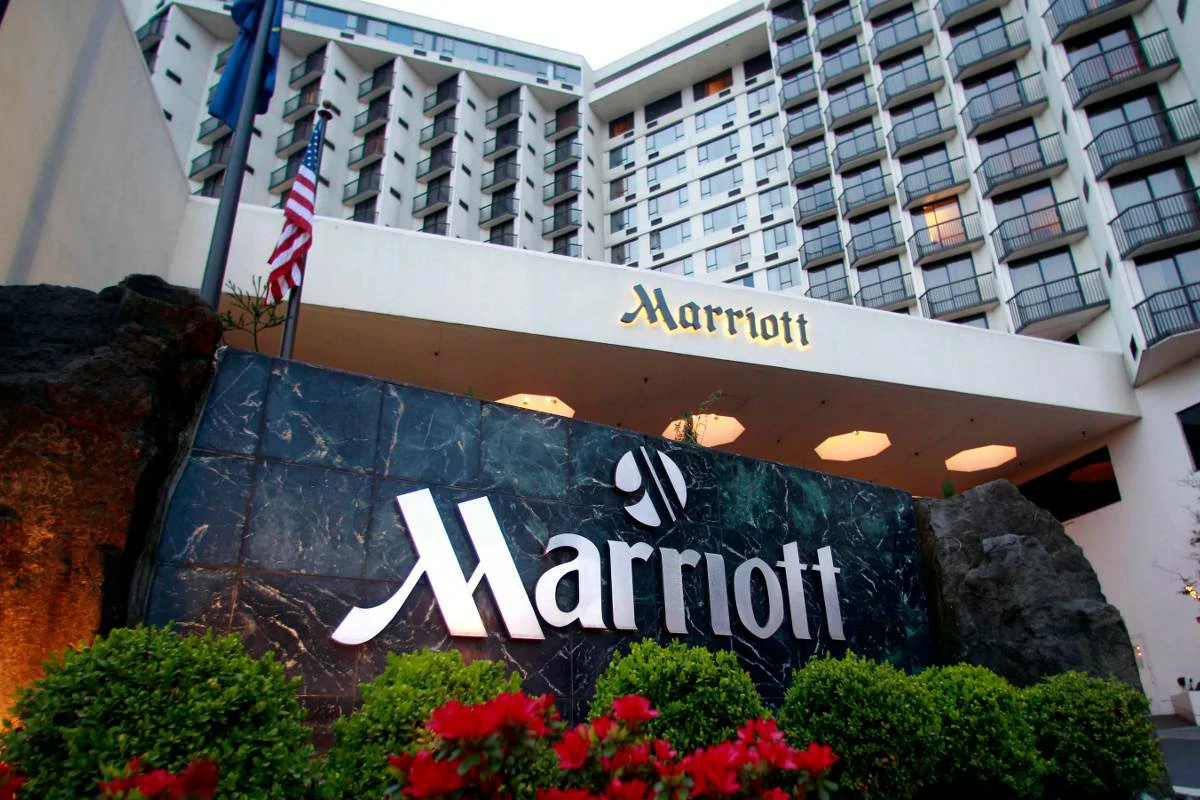
What is Franchising?
Franchising is a strategic business model where a well-established company (the franchisor) grants another party (the franchisee) the right to use its brand name, trademarks, and operational systems in exchange for a fee.
Essentially, the franchisee becomes a licensed operator of a proven business concept.
How Does Franchising Work in the Hotel Industry?
In the hotel industry, franchising allows established hotel chains like Marriott International to rapidly expand their presence without having to directly invest in and manage each new property.
Franchisees, often individual entrepreneurs or investment groups, provide the capital to build or acquire hotels and then operate them under the franchisor’s brand and standards.
The franchisor, in turn, offers support in areas like marketing, reservations systems, training, and quality assurance.
Why Do Hotel Chains Like Marriott Utilize Franchising?
There are several compelling reasons why hotel chains like Marriott embrace franchising:
Rapid Expansion: Franchising allows for faster growth and market penetration than building and operating hotels solely through company-owned resources.
Shared Investment and Risk: Franchisees share the financial burden and risk associated with opening and running hotels, freeing up capital for the franchisor to invest in other areas.
Local Market Expertise: Franchisees often possess in-depth knowledge of local markets, allowing them to tailor operations and marketing strategies to better attract guests.
Brand Recognition and Loyalty: By associating with a well-known brand like Marriott, franchisees benefit from established brand recognition and customer loyalty.
Operational Support and Systems: Franchisors provide comprehensive support in areas like training, technology, and marketing, enabling franchisees to operate more efficiently.
Maria Macedo Expert Opinion
According to Maria Macedo, Senior Vice President of Development for the Caribbean and Latin America at Marriott International, “The franchise model is a key pillar of Marriott’s global growth strategy. It allows us to leverage the entrepreneurial spirit and local expertise of our franchise partners while maintaining the high standards of quality and service that our guests expect.”
Marriott’s Franchise Model
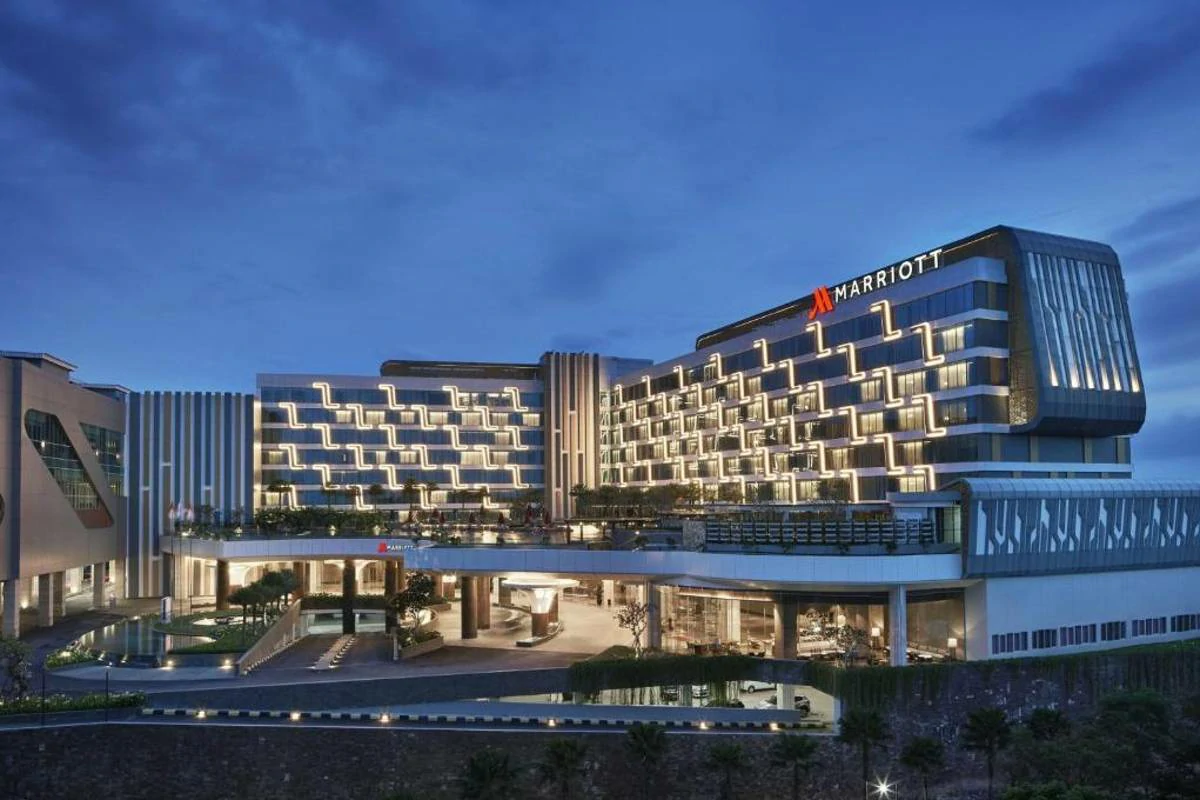
1. How many Marriott hotels are franchised?
Marriott International boasts an impressive global portfolio of over 8,100 properties across 139 countries and territories. A significant portion of these hotels, approximately 50%, operate under franchise agreements.
This extensive network of franchised hotels underscores the success and effectiveness of Marriott’s franchise model in fueling its global expansion.
2. Which Marriott brands are typically franchised?
Marriott International offers a diverse array of 30 hotel brands catering to various segments of the market, from luxury to select-service.
While the company employs a flexible approach to franchising, certain brands are more commonly franchised than others.
Some of the most frequently franchised Marriott brands include:
Courtyard by Marriott: A popular choice for business travelers, known for its comfortable accommodations and convenient amenities.
Fairfield Inn by Marriott: A budget-friendly option offering reliable quality and essential services.
Residence Inn by Marriott: Extended-stay hotels designed for longer visits, featuring spacious suites with kitchenettes.
SpringHill Suites by Marriott: Stylish and affordable hotels with spacious suites, ideal for families and extended stays.
TownePlace Suites by Marriott: Extended-stay hotels offering a comfortable and home-like atmosphere for long-term guests.
Tony Capuano Expert Opinion
“Marriott’s franchise model is designed to accommodate a wide range of brands and investment levels,” says Tony Capuano, CEO of Marriott International. “We offer a flexible and adaptable platform that empowers franchisees to choose the brands and markets that best align with their business goals and expertise.”
3. What are the benefits of franchising for Marriott?
Franchising has played a pivotal role in Marriott’s remarkable global expansion and continued success. The benefits of this model for Marriott are multifaceted and include:
Accelerated Growth and Market Penetration: Franchising enables Marriott to rapidly expand its footprint into new markets and territories without incurring the full financial burden of constructing and operating each hotel. This agile approach has been instrumental in solidifying Marriott’s position as the world’s largest hotel company by room count.
Reduced Financial Risk and Capital Investment: By partnering with franchisees, Marriott mitigates the financial risks associated with hotel development and operations. Franchisees provide the capital for construction and renovations, freeing up Marriott’s resources for other strategic initiatives.
Access to Local Expertise and Insights: Franchisees often possess valuable knowledge of local markets, consumer preferences, and regulatory landscapes. This localized expertise allows Marriott to tailor its offerings and marketing strategies to specific regions, enhancing guest experiences and maximizing occupancy rates.
Enhanced Brand Awareness and Loyalty: Through franchising, Marriott leverages the entrepreneurial spirit and dedication of its franchisees to maintain high standards of quality and service. This consistent delivery of exceptional experiences reinforces brand loyalty and attracts new customers.
Increased Revenue Streams: Franchising generates a steady stream of revenue for Marriott through various fees, such as initial franchise fees, royalty fees, and marketing fees. These fees contribute significantly to the company’s overall financial performance.
4. What are the challenges of franchising for Marriott?
While franchising offers numerous advantages, it also presents certain challenges that Marriott must navigate:
Maintaining Brand Consistency and Quality: Ensuring consistent brand standards and service quality across a vast network of franchised hotels can be demanding. Marriott invests in comprehensive training programs and stringent quality assurance measures to uphold its brand reputation and guest expectations.
Managing Franchisee Relationships: Building and maintaining strong relationships with franchisees is crucial for long-term success. Marriott strives to foster open communication, provide ongoing support, and address any concerns or disputes promptly and fairly.
Adapting to Evolving Market Dynamics: The hotel industry is constantly evolving, with shifting consumer preferences and emerging technologies. Marriott must remain agile and innovative to adapt to these changes while supporting its franchisees in staying competitive.
Scott McCoy Expert Opinion
As Scott McCoy, Senior Vice President of Global Franchise Operations at Marriott International, emphasizes, “The success of our franchise model hinges on a collaborative partnership built on trust, transparency, and shared values. We are committed to providing our franchisees with the resources and support they need to thrive in an ever-changing landscape.”
Becoming a Marriott Franchisee
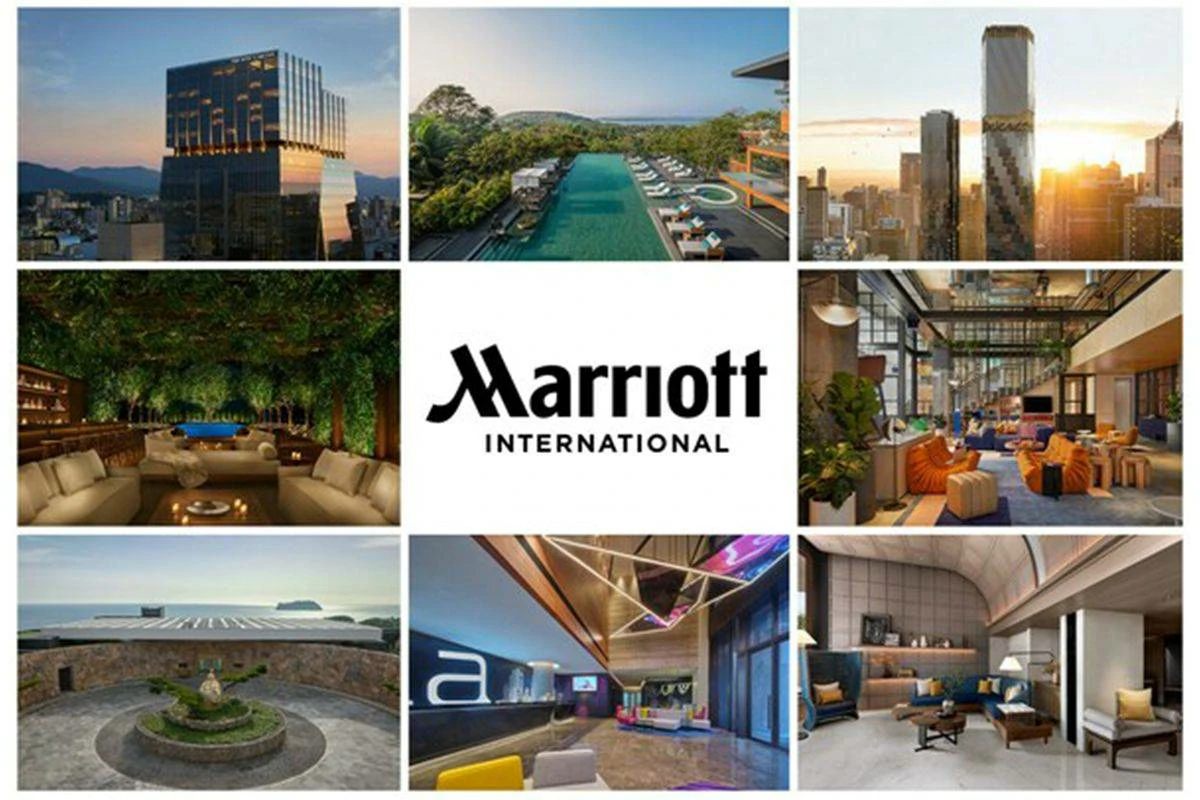
1. What are the requirements to become a Marriott franchisee?
Embarking on the journey to become a Marriott franchisee requires a combination of financial capability, industry experience, and a commitment to upholding the brand’s standards of excellence. Some key requirements include:
Financial Resources: Marriott typically seeks franchisees with a substantial net worth and liquidity to ensure they can successfully fund the development and operation of a hotel. The specific financial requirements vary depending on the brand and location, but significant capital investment is necessary.
Industry Experience: While prior hotel management or ownership experience is not always mandatory, it is highly valued by Marriott. Demonstrating a proven track record in the hospitality industry can strengthen your application and increase your chances of approval.
Operational Capability: Marriott expects franchisees to possess strong operational and management skills to effectively run a hotel. This includes expertise in areas such as finance, marketing, human resources, and guest services.
Alignment with Brand Values: Marriott prioritizes franchisees who share its core values of putting people first, pursuing excellence, embracing change, acting with integrity, and serving our world. A commitment to upholding these values is essential for a successful partnership.
2. How much does it cost to open a Marriott franchise?
The cost of opening a Marriott franchise varies considerably depending on several factors, including the brand, location, size of the hotel, and construction costs. However, it’s important to be prepared for a substantial investment.
According to the Marriott Franchise Disclosure Document (FDD), the estimated initial investment for a new-build Marriott hotel can range from $15 million to well over $100 million. This includes expenses such as:
- Initial Franchise Fee: A one-time fee paid to Marriott for the right to use their brand and systems.
- Development Costs: Costs associated with acquiring land, construction, and pre-opening expenses.
- Working Capital: Funds needed to cover operating expenses during the initial ramp-up phase.
- Furniture, Fixtures, and Equipment (FF&E): The cost of furnishing and equipping the hotel.
Additionally, ongoing fees such as royalty fees (a percentage of revenue) and marketing fees are payable to Marriott throughout the franchise agreement.
It’s crucial to consult with Marriott’s development team and carefully review the FDD to obtain a precise estimate of the investment required for your specific project.
Bill Marriott Expert Opinion
As Bill Marriott, Executive Chairman and Chairman of the Board of Marriott International, once said, “Our franchisees are our partners in delivering exceptional experiences to our guests. We are committed to providing them with the tools and support they need to succeed in this dynamic industry.”
3. What Support Does Marriott Provide to its Franchisees?
Marriott International is committed to fostering the success of its franchisees through a comprehensive suite of support services. This robust support system includes:
Pre-Opening Assistance: Marriott provides guidance and resources throughout the development and pre-opening phases, ensuring a smooth and efficient launch. This includes site selection analysis, design and construction support, and operational planning.
Training and Development: Franchisees and their staff gain access to extensive training programs covering all aspects of hotel operations, from front desk procedures to revenue management. These programs equip teams with the knowledge and skills necessary to deliver exceptional guest experiences.
Marketing and Sales Support: Marriott leverages its global marketing power and extensive distribution channels to promote franchisee properties. This includes participation in Marriott’s award-winning loyalty programs, national advertising campaigns, and digital marketing initiatives.
Operational Systems and Technology: Franchisees benefit from access to Marriott’s cutting-edge technology platforms, including property management systems, revenue management tools, and reservation systems. These systems streamline operations, enhance efficiency, and drive profitability.
Ongoing Guidance and Consultation: Marriott maintains a dedicated team of experts who provide ongoing support and guidance to franchisees. This includes regular performance reviews, operational consultations, and access to industry insights and best practices.
John Murphy Expert Opinion
“Marriott’s franchise support is truly world-class,” says John Murphy, a seasoned hotel owner and operator with multiple Marriott franchises. “They provide us with the tools, resources, and expertise we need to succeed in a competitive market. Their commitment to our success is unwavering.”
4. What are the risks and rewards of owning a Marriott franchise?
Owning a Marriott franchise presents a unique blend of risks and rewards, similar to any entrepreneurial venture.
Potential Rewards
Proven Business Model: Leveraging Marriott’s established brand recognition, proven operational systems, and global marketing power can significantly increase the chances of success.
Strong Revenue Potential: Marriott hotels often command premium rates due to their reputation for quality and service, leading to attractive revenue opportunities.
Ongoing Support and Guidance: The comprehensive support provided by Marriott throughout the franchise lifecycle can help mitigate risks and optimize performance.
Networking and Collaboration: Franchisees become part of a global network of Marriott owners and operators, fostering valuable relationships and learning opportunities.
Potential Risks
Significant Financial Investment: The initial investment and ongoing fees associated with a Marriott franchise can be substantial, requiring careful financial planning and risk assessment.
Market Volatility: The hotel industry is susceptible to economic fluctuations, seasonal variations, and unforeseen events that can impact occupancy rates and revenue.
Competition: The hospitality sector is highly competitive, requiring franchisees to actively differentiate their properties and deliver exceptional guest experiences.
Brand Standards Compliance: Adhering to Marriott’s stringent brand standards and operational guidelines is essential but can require significant attention to detail and ongoing investment.
The Impact of Franchising on Marriott
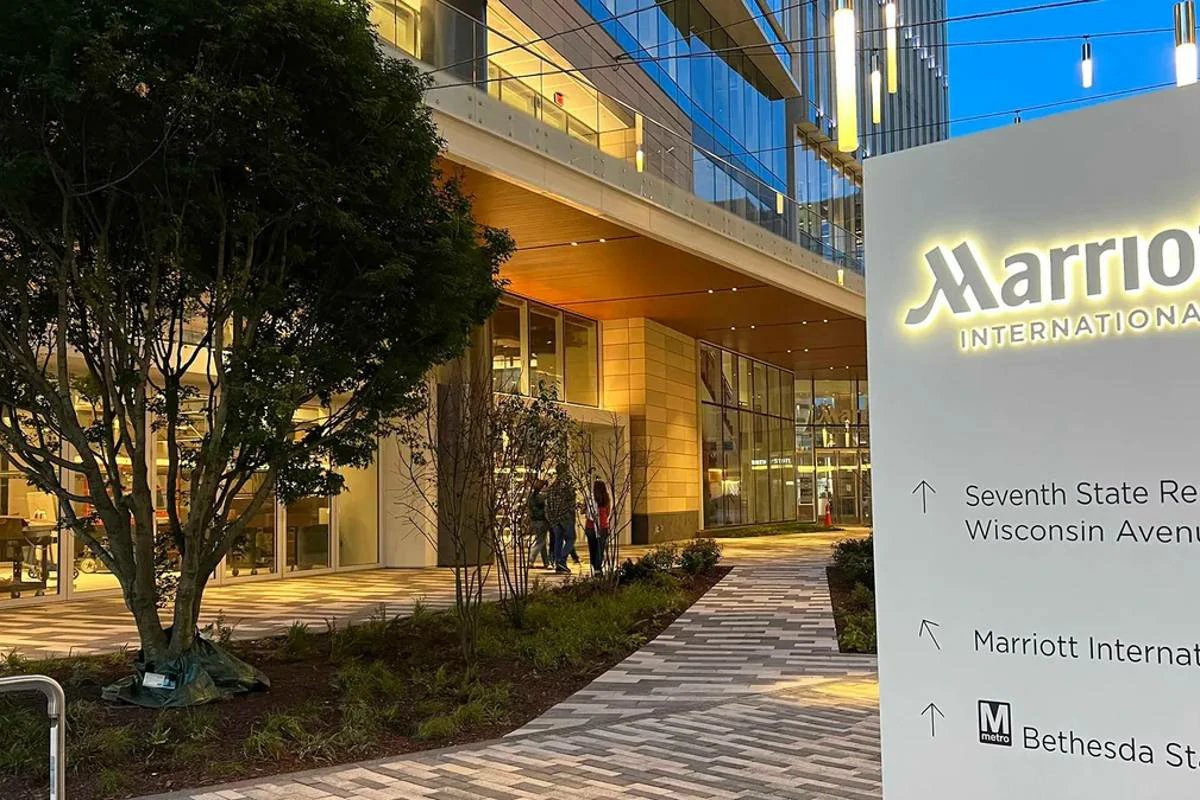
1. How has franchising contributed to Marriott’s growth?
Franchising has been a cornerstone of Marriott International’s remarkable growth trajectory, propelling it to the forefront of the global hospitality industry. This strategic model has contributed to Marriott’s expansion in several key ways:
Accelerated Global Expansion: Franchising has enabled Marriott to rapidly establish a presence in diverse markets worldwide, from bustling urban centers to exotic resort destinations. By partnering with local investors and entrepreneurs, Marriott has penetrated new territories and captured market share at an unprecedented pace.
Increased Market Penetration: Franchising has allowed Marriott to achieve greater market penetration within existing markets. By leveraging the local knowledge and networks of franchisees, the company has been able to identify and capitalize on untapped opportunities, resulting in a denser concentration of Marriott properties in key regions.
Diversification of Brand Portfolio: Franchising has facilitated the diversification of Marriott’s brand portfolio, catering to a broader spectrum of travelers and preferences. By partnering with franchisees who possess expertise in specific market segments, Marriott has been able to introduce and expand brands tailored to various budgets and lifestyles.
Financial Flexibility and Resilience: The franchise model has enhanced Marriott’s financial flexibility and resilience. By sharing the financial burden of development and operations with franchisees, Marriott has been able to allocate resources to strategic initiatives, such as brand innovation, technology investments, and customer experience enhancements.
Leeny Oberg Expert Opinion
According to Leeny Oberg, Executive Vice President and Chief Financial Officer of Marriott International, “Franchising has been a key driver of our growth and profitability. It has allowed us to expand our global footprint, diversify our brand portfolio, and create value for our shareholders.”
2. How does franchising affect the guest experience at Marriott hotels?
Marriott’s commitment to delivering exceptional guest experiences remains unwavering, regardless of whether a hotel is company-owned or franchised. The company employs rigorous quality assurance measures and provides comprehensive support to its franchisees to ensure consistent adherence to brand standards.
While franchisees have some flexibility in adapting to local preferences and market conditions, they are bound by Marriott’s brand standards, which encompass everything from service protocols to design aesthetics. This ensures that guests can expect a consistent and high-quality experience across all Marriott properties, regardless of ownership structure.
Furthermore, Marriott’s franchisees are often deeply invested in their local communities and strive to provide personalized and authentic experiences that resonate with guests. This local touch can enhance the overall guest experience and create a sense of connection to the destination.
Tina Edmundson Expert Opinion
As Tina Edmundson, Global Brand and Marketing Officer for Marriott International, states, “Our franchisees are passionate about delivering exceptional hospitality and creating memorable experiences for our guests. They are an integral part of our brand family and play a vital role in our success.”
3. How does Marriott ensure quality and consistency across its franchised properties?
Upholding a consistent brand experience across a vast network of franchised hotels is a top priority for Marriott. The company employs a multi-pronged approach to ensure quality and consistency:
Comprehensive Brand Standards: Marriott maintains detailed brand standards that encompass all aspects of hotel operations, from service protocols and design aesthetics to amenities and facilities. These standards serve as a blueprint for franchisees, ensuring a unified brand identity and guest experience.
Rigorous Quality Assurance: Marriott conducts regular quality assurance audits of its franchised properties to verify compliance with brand standards. These audits cover various areas, including cleanliness, maintenance, service delivery, and guest satisfaction.
Training and Development Programs: Marriott invests heavily in comprehensive training programs for franchisees and their staff. These programs cover all facets of hotel operations, from front desk procedures to revenue management, equipping teams with the knowledge and skills necessary to deliver exceptional service.
Technology and Data Analytics: Marriott leverages advanced technology and data analytics to monitor and evaluate the performance of its franchised hotels. This allows the company to identify areas for improvement and provide targeted support to franchisees.
Open Communication and Collaboration: Marriott fosters a culture of open communication and collaboration with its franchisees. Regular meetings, conferences, and online forums provide opportunities for franchisees to share feedback, learn from each other, and stay abreast of the latest industry trends.
Julius Robinson Expert Opinion
As Julius Robinson, Chief Sales & Marketing Officer, U.S. and Canada at Marriott International, emphasizes, “We are committed to providing our guests with a consistent and exceptional experience at every Marriott hotel, regardless of whether it is company-owned or franchised. Our robust quality assurance program and ongoing support for our franchisees are essential to achieving this goal.”
4. What are the future plans for franchising at Marriott?
Marriott remains committed to franchising as a key growth strategy, with ambitious plans for continued expansion in the years to come.
The company aims to further diversify its brand portfolio, introduce new brands catering to emerging market segments, and penetrate untapped markets worldwide.
Marriott is also investing in innovative technologies and digital platforms to enhance the franchisee experience and drive operational efficiency. This includes developing new tools for revenue management, guest engagement, and sustainability initiatives.
Anthony Capuano Expert Opinion
As Anthony Capuano, CEO of Marriott International, stated, “We see tremendous potential for continued growth through franchising. Our focus is on partnering with experienced and passionate operators who share our commitment to delivering exceptional hospitality and creating value for our guests, owners, and communities.”
Case Studies: Successful Marriott Franchisees

1. Profile of a Successful Marriott Franchise Owner
Meet Sarah Johnson, a seasoned hotelier and owner of multiple Marriott franchises across the United States. Sarah’s journey into the world of Marriott franchising began with a passion for hospitality and a keen eye for business opportunities.
Starting with a single Courtyard by Marriott property in a suburban market, Sarah quickly established a reputation for exceptional service and operational excellence.
Her dedication to guest satisfaction and commitment to Marriott’s brand standards earned her accolades and fueled her desire to expand.
Over the years, Sarah has grown her portfolio to include several Marriott brands, including Residence Inn, SpringHill Suites, and Fairfield Inn. Her success can be attributed to several key factors:
- Strategic Location Selection: Sarah meticulously analyzes market trends and demographics to identify promising locations for new hotels.
- Strong Financial Management: She maintains a disciplined approach to financial management, ensuring profitability and sustainability.
- Empowered Workforce: Sarah invests in her employees, providing comprehensive training and fostering a positive work environment.
- Community Engagement: She actively engages with the local community, supporting charitable initiatives and building strong relationships with local businesses.
2. Challenges and Opportunities Faced by Marriott Franchisees
While Marriott franchisees benefit from a strong brand and extensive support system, they also face various challenges in the dynamic hospitality landscape:
Intense Competition: The hotel industry is highly competitive, with numerous brands vying for market share. Franchisees must constantly strive to differentiate their properties and attract guests through unique offerings and exceptional service.
Economic Fluctuations: Economic downturns and unforeseen events like the COVID-19 pandemic can significantly impact occupancy rates and revenue. Franchisees must be prepared for such challenges and develop contingency plans to navigate through turbulent times.
Rising Operating Costs: Expenses such as labor, utilities, and property taxes can escalate, putting pressure on profitability. Franchisees need to manage costs effectively while maintaining high standards of quality.
Evolving Guest Expectations: Today’s travelers are increasingly discerning and tech-savvy, demanding personalized experiences and seamless technology integration. Franchisees must stay ahead of the curve by embracing innovation and adapting to changing guest preferences.
However, these challenges also present opportunities for growth and innovation. Franchisees who can adapt to changing market dynamics, embrace technology, and deliver exceptional guest experiences can thrive in the competitive hospitality landscape.
3. Lessons Learned from Successful Marriott Franchisees
Successful Marriott franchisees offer valuable insights and lessons for aspiring hoteliers:
Passion for Hospitality: A genuine passion for hospitality is a driving force behind success. Franchisees who are truly invested in creating memorable guest experiences are more likely to thrive.
Strong Business Acumen: Solid financial management, strategic decision-making, and operational expertise are essential for long-term profitability.
Customer-Centric Approach: Focusing on guest satisfaction and exceeding expectations is paramount. Franchisees who prioritize the guest experience build loyalty and generate positive word-of-mouth.
Continuous Improvement: The hospitality industry is constantly evolving. Successful franchisees embrace change, invest in ongoing learning, and continuously seek ways to enhance their operations.
Alternative Models to Franchising
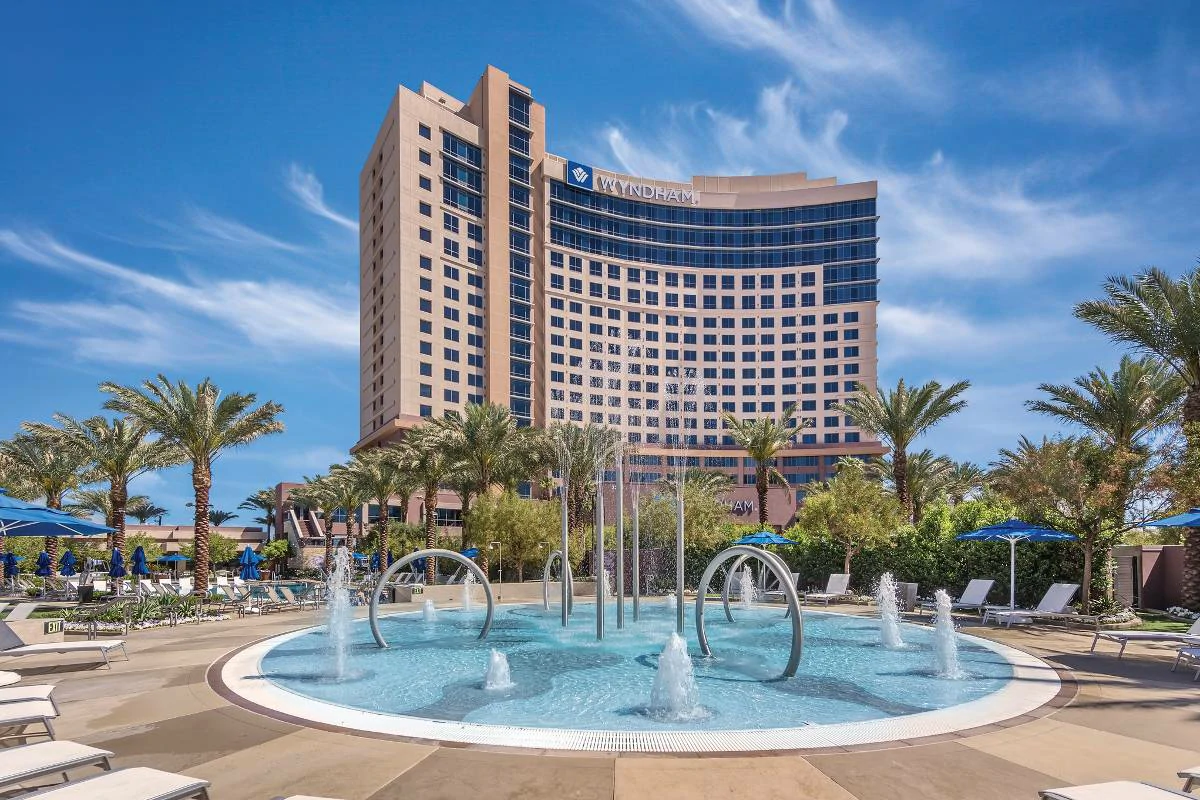
While franchising has proven to be a successful model for Marriott and many other hotel chains, it’s not the only path to hotel ownership and operation. Several alternative models exist, each with its own advantages and considerations.
1. Company-Owned and Operated Hotels
In this model, the hotel chain retains full ownership and control over the property.
This allows for direct oversight of operations, ensuring strict adherence to brand standards and a consistent guest experience.
However, it also requires significant capital investment and carries the full financial risk.
2. Management Contracts
Under a management contract, the hotel owner hires a third-party management company (often a reputable hotel chain) to operate the property on their behalf.
The management company oversees daily operations, marketing, and revenue management, while the owner retains ownership and financial responsibility.
This model allows owners to leverage the expertise and resources of established hotel operators without the need for direct involvement in day-to-day management.
3. Joint Ventures
Joint ventures involve a partnership between two or more parties to develop and operate a hotel.
This model allows for shared investment, risk, and expertise. It can be particularly beneficial for projects requiring significant capital or specialized knowledge.
4. Hybrid Models
Hybrid models combine elements of different ownership and operation structures. For example, a hotel chain might own and operate some properties while franchising others.
This approach allows for flexibility and diversification, tailoring the model to specific market conditions and strategic goals.
Jan Freitag Expert Opinion
According to Jan Freitag, National Director of Hospitality Analytics at CoStar Group, “The hotel industry is constantly evolving, and owners and operators are increasingly exploring alternative models to traditional franchising. These models offer flexibility and customization, allowing them to optimize their investment and operational strategies.”
FAQs
1. How do I find out if a specific Marriott hotel is franchised?
While Marriott doesn’t explicitly disclose the ownership structure of individual hotels on its website, you can often determine this by searching online for the hotel’s ownership information or contacting the hotel directly. Additionally, some third-party websites and resources may provide information on hotel ownership structures.
2. How do I contact Marriott about becoming a franchisee?
Marriott has a dedicated Hotel Development website where you can find comprehensive information about their franchise opportunities and submit an inquiry.
3. What are the most popular Marriott brands for franchising?
Some of the most popular Marriott brands for franchising include Courtyard by Marriott, Fairfield Inn by Marriott, Residence Inn by Marriott, SpringHill Suites by Marriott, and TownePlace Suites by Marriott. These brands offer a range of options for different market segments and investment levels.
4. What are the typical fees associated with a Marriott franchise?
The fees associated with a Marriott franchise vary depending on the brand, location, and size of the hotel. Generally, they include an initial franchise fee, royalty fees (a percentage of revenue), marketing fees, and other miscellaneous fees. The Marriott Franchise Disclosure Document (FDD) provides detailed information on these fees.
5. How does Marriott handle disputes with franchisees?
Marriott strives to maintain positive and collaborative relationships with its franchisees. However, disputes can arise from time to time. The Franchise Agreement outlines a dispute resolution process that typically involves negotiation, mediation, or arbitration. In some cases, legal action may be necessary.
The Bottom Line
Marriott’s franchise model presents a compelling opportunity for aspiring hoteliers and investors to tap into the global hospitality market. The advantages are clear: a robust brand reputation, extensive support systems, and the potential for lucrative returns.
However, it’s crucial to acknowledge the significant financial commitment required and the inherent risks associated with any business venture.
As with any investment, thorough due diligence is essential. Aspiring franchisees should carefully evaluate their financial resources, industry experience, and risk tolerance before embarking on this journey.
By partnering with Marriott, franchisees gain access to a wealth of resources and expertise, but success ultimately hinges on their ability to manage operations effectively, adapt to market dynamics, and deliver exceptional guest experiences.
